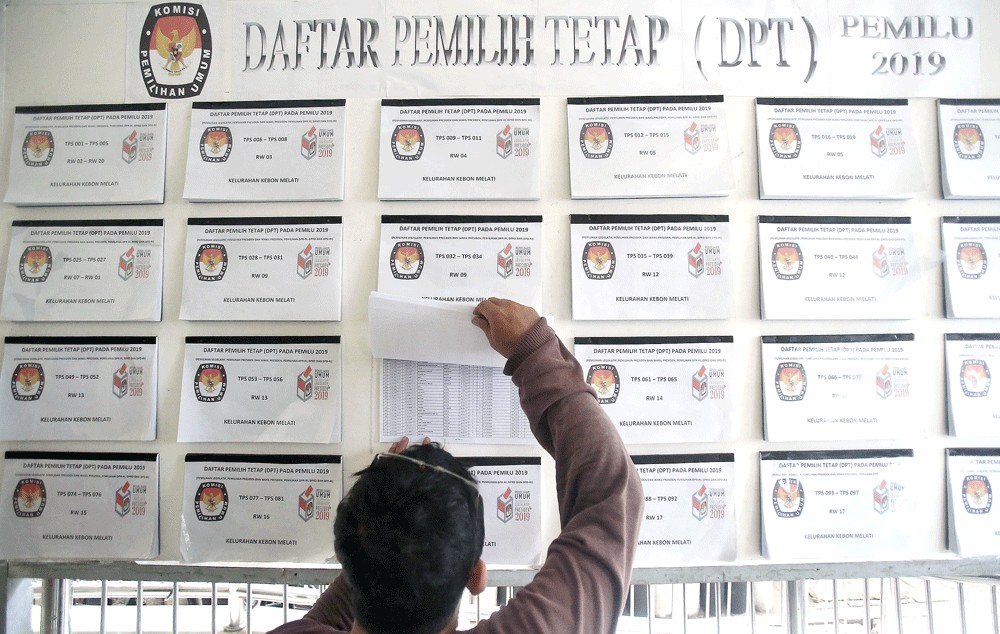Popular Reads
Top Results
Can't find what you're looking for?
View all search resultsPopular Reads
Top Results
Can't find what you're looking for?
View all search resultsPublic data should be used, not abused
Change text size
Gift Premium Articles
to Anyone
S
tatistical data began to be used in political science as a basis for decision making in the late 1940s and early 1950s in North America, along with the emergence of behavioral approaches that relied on statistics and quantitative methods to analyze patterns of human behavior.
This was triggered by the failure of political science to contribute in anticipating the emergence of fascism that led to world war. Post-world war, donor agencies such as Carnegie, Rockefeller and Ford provided much support for various studies of people’s behavior in various political situations.
The hope was that political science could contribute to public policy by relying on data based on reality, as scholars Albert Somit and Joseph Tanenhaus wrote in 1967. This support raises a lot of policy institute conducted research about policy based on empirical data.
Previously, political science was considered to be too focused on political institutions to produce only regulations on authority and duties, but missed understanding what was happening in society and what policies were right to be issued to respond to it.
Much research has been done and data collected to study people’s preferences to formulate a strategy for winning elections.
The political behavior approach that relies on data is eventually narrowing because the data collected is used only for the benefit of the political elite. Before an election, a survey is conducted to win public office and after the election, a survey is conducted to measure the legitimacy and level of public trust.
In the 1960s, the emergence of movements that demanded equality (left, feminist and pluralism movements) voiced the issue of inequality and socio-economic inequality and voicing related to class issues, as a response to the implications of various policies by established institutions.
The American Political Science Association has responded to the crisis of scientific relevance; political science has often stuttered in the face of cultural resistance, economic inequality and issues of social upheaval related to racial discrimination and equality between men and women.
The demands of transparency and accountability for the government encourage discourse on open data and open government. In the United States this has been encouraged since the Freedom of Information Act was implemented in 1966, according to Harlan Yu and David Robinson.
Indonesia is in the process of going through the same stages as North America. In the 20 years since the Reform Era, political science in Indonesia still has difficulty contributing to solving political problems and policy making.
The biggest contribution of political scientists in Indonesia is still electoral issues and voting behavior. Society is often the subject of measurement and contributes to data collection, without understanding what is really happening.
Political data collected from the community will lead to two uses: formulating a winning strategy in elections or forming public opinion to gain legitimacy. From these two things, Indonesians experience a form of data exploitation.
Data is collected from them without being able to participate, using it to voice interests or criticize policies. Policymakers still rely on intuitions and are often bias in adopting a policy. Political science lags far behind economic science in the use of data for public policy.
Data always depends on who uses it and for what purpose. To bring control, access to data and political participation must be opened. The scholar Tiago Peixoto in 2013 raised two preconditions for how data can encourage accountability and political participation to influence political policy.
First, publicity and accessibility of data to the public. As a consequence of collecting data from society, society should be able to utilize the data collected to voice its interests.
Second, the need for encouragement and collaboration from third parties, namely political agents (civil society, political activists, technology-based application developers and various media platforms) to present various rival data from public participation to influence political policy.
At present, data is everywhere and can be collected by anyone. Data is a matter of interpreting meaning, so it requires a widespread public participation process, so that there is no single meaning and dominates the truth.
Yu and Robinson in 2012 wrote on the ambiguity of new government, saying that the challenge in the era of data utilization technology, the government must not only be transparent about data but also encourage open data so that it can become a force for public control.
Open data makes existing data and information easy to be processed, analyzed, and criticized by the public. It also helps facilitate the government in creating good public services.
Data transparency by open government is assumed to have an impact on at least two things. First, encouraging better public services. Second, encouraging community participation to use data to criticize and control the government.
However, according to Peixoto, since the initial discourse on open data and government, at the end of the 1960s until 50 years later with such sophisticated technological developments, societies have only been able to achieve data and information openness (transparency) and have not been able to encourage the use of data for political participation and public control over the policy making process (accountability).
Criticism of open data and governance in political systems with behavioral approaches is that the political elite and policy makers use data to justify and legitimize their policies without encouraging discourse in society.
Without political participation there is no control over the policy even though it is claimed to be based on empirical data and evidence.
***
The writer is a statistician at Cakra Wikara Indonesia, an NGO on social and political studies, and a political scientist at the University of Indonesia (UI).











